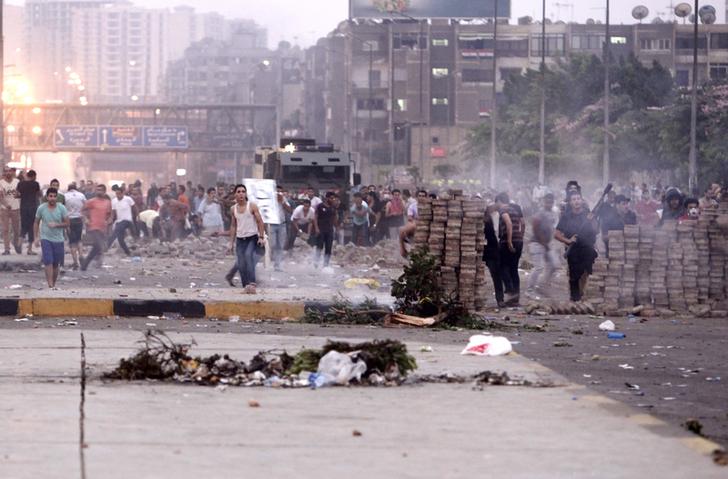Latest NEWS
- Aswat Masriya, the last word
- Roundup of Egypt's press headlines on March 15, 2017
- Roundup of Egypt's press headlines on March 14, 2017
- Former Egyptian President Hosni Mubarak to be released: lawyer
- Roundup of Egypt's press headlines on March 13, 2017
- Egypt's capital set to grow by half a million in 2017
- Egypt's wheat reserves to double with start of harvest -supply min
- Roundup of Egypt's press headlines on March 12, 2017
Death toll from attack on Mursi supporters rises to at least 70

Opponents of deposed Egyptian President Mohamed Mursi throw stones at his supporters during clashes in Nasr city area, east of Cairo July 27, 2013. REUTERS/Asmaa Waguih
By Tom Perry and Maggie Fick
CAIRO, July 27 (Reuters) - Egyptian security forces shot dead at least 70 supporters of ousted President Mohammed Mursi early on Saturday, his Muslim Brotherhood said, deepening the turmoil which has convulsed Egypt for weeks.
Brotherhood spokesman Gehad El-Haddad said the shooting started shortly before pre-dawn morning prayers on the fringes of a round-the-clock vigil being staged by backers of Mursi, who was toppled by the army more than three weeks ago.
"They are not shooting to wound, they are shooting to kill," Haddad said, adding that the death toll might be much higher.
Al Jazeera's Egypt television station reported that 120 had been killed and some 4,500 injured in the early morning violence on the fringes of a round-the-clock vigil being staged by backers of Mursi near Cairo's Rabaa al-Adawia mosque.
Reporters at the scene said firing could still be heard hours after the troubles started.
"I have been trying to make the youth withdraw for five hours. I can't. They are saying have paid with their blood and they do not want to retreat," said Saad el-Hosseini, a senior Brotherhood politician.
"It is a first attempt to clear Rabaa al-Adawia," he added.
There was no immediate comment from state authorities on what had happened.
Supporters and opponents of Mursi staged mass rival rallies across the country on Friday, bringing hundreds of thousands into the streets and laying bare deep divisions within the Arab world's most populous country.
Well over 200 people have died in violence since the overthrow of Mursi, including at least nine on Friday, most of them Brotherhood supporters.
Army chief General Abdel Fattah al-Sisi, who played a central role in the overthrow of Mursi following huge demonstrations against his year-long rule, called for Egyptians to rally on Friday to give him a mandate to tackle "violence and terrorism".
Hundreds of thousands heeded his call, but Muslim Brotherhood supporters also staged mass, counter-rallies, demanding the reinstatement of Mursi, who was placed under investigation on Friday for a raft of crimes, including murder.
"LIVE ROUNDS"
Asked what the strategy of the Brotherhood would be after the second mass killing of its supporters this month by security forces, Haddad said:
"When there are divisions, we go to the ballot box."
Haddad said police started firing repeated rounds of teargas sometime after 3:00 a.m. (0100 GMT) at protesters who had spilled out of the main area of the Rabaa sit-in and were on a main thoroughfare close to 6th October Bridge.
"Through the smog of the gas, the bullets started flying," he said. In addition to "special police forces in black uniforms" firing live rounds, he said that snipers shot from the roofs of a university, buildings in the area, and a bridge.
State news agency MENA quoted an unnamed security source as saying that only teargas was used to disperse protesters. He said no firearms were used.
Haddad said the pro-Mursi supporters had used rocks to try to defend themselves. On the podium outside the Rabaa mosque, a speaker urged people to retreat from the gunfire, but "men stayed to defend themselves because women and children are inside the sit-in", he said.
It was the second time this month there had been a mass killing near Rabaa. On July 8, 53 people died when armed men shot into a crowd after morning prayers close to a Republican Guard compound in the area.
"This is much more brutal because the Republican Guard looked like a tactical military operation. This one looks like a much more brutal aggression," Haddad said.
Egypt's army-installed interior minister, Mohamed Ibrahim, said on Friday that the month-old Cairo vigils by Mursi supporters would be "brought to an end, soon and in a legal manner", state-run al Ahram news website reported.
There is deepening alarm in the West over the army's move against Mursi. The country of 84 million people forms a bridge between the Middle East and North Africa and receives $1.5 billion a year in mainly military aid from Washington.
The investigation into Mursi centres on accusations that he conspired with the Palestinian Islamist group Hamas to escape from jail during the 2011 uprising against veteran autocrat Hosni Mubarak, killing some prisoners and officers, kidnapping soldiers and torching buildings. (Additional reporting by Shadia Nasralla, Yasmine Saleh, Tom Perry, Noah Browning, Tom Finn, Maggie Fick, Omar Fahmy, Edmund Blair, Michael Georgy and Ahmed Tolba in Cairo, Abdel Rahman Youssef in Alexandria and Yusri Mohamed in Ismailia,; Writing by Crispian Balmer; Editing by Louise Ireland and Michael Georgy)










